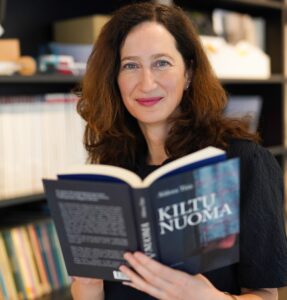She believes that this myth is common probably because introverts find it easier to deal with the loneliness of writing.
“Personally, it is not a lonely activity for me – I am a part of a writing group. Although we all write alone, later we meet, share our texts – read and discuss them,” says the KTU creative writing teacher.
6. Writers have to read a lot
“The simple truth is, if you write fiction yourself, you probably think it is a valuable thing. If you think it is valuable, you read a lot. Writers read a lot indeed,” assures Tüür.
Shea adds that writers often dig deeper while reading, read with a goal in mind, for example to learn, how sentences are stringed together, how one or another problem is solved.
“As I mentioned, I am currently writing about death and murder, so I am reading and delving into detective fiction. I am trying to understand what the formula of this genre is,” says a writer and KTU teacher.
She claims that the books of other authors serve only as an inspiration not with the aim to copy the ideas. Unless it happens unconsciously: for example, someone uses very figurative language so it appears in your text.
7. All writers know the rules of spelling, punctuation and grammar perfectly well
According to Tüür, not necessarily all writers will be linguists and not all linguists will be writers.
“The fact is that not all those who know the language well will be able to tell a story. Of course, usually writers read a lot and write essays well in school. If this is the case, it is likely that your language skills are better than average,” she says.
However, there is not necessarily a causal relationship here. Therefore, according to the KTU creative writing teacher, the writer may not know the rules related to the use of the language perfectly.
8. Making a living from writing is impossible
“J. K. Rowling makes a great living, – smiles A. Tüür. – However, if you write in Lithuanian and no one translates your works into other languages, the pay is not very impressive so you could make a living from being a writer”.
However, Tüür points out that writers often do other writing related jobs, such as translating texts or writing articles for the news portals.
“If you live in a country whose language is spoken all over the world and that book becomes a bestseller, it is really possible to make a living from writing. If a film is made based on your work, the earnings are even better,” says KTU Associate Professor-Practitioner, writer Tüür.
Interested in trying a hand in writing? Enrol to Creative Writing classes, available for students from all the faculties of KTU.





